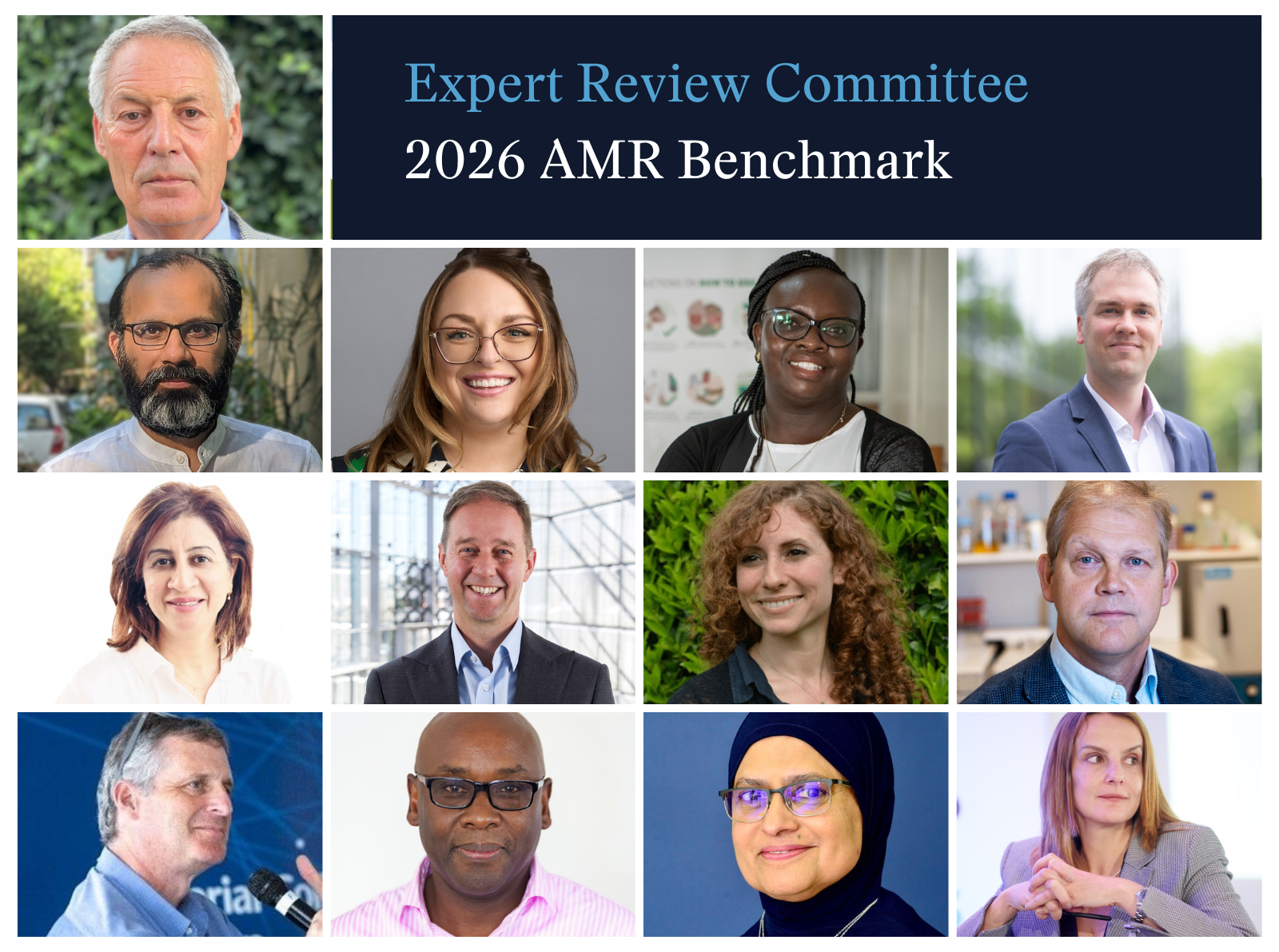Foundation names Expert Review Committee for next AMR Benchmark
Before each iteration of the AMR Benchmark Report, the Foundation assesses the analytical parameters that are used to evaluate and score pharmaceutical companies’ efforts to help curb AMR.
Through this process of developing the AMR Benchmark Methodology, the Foundation engages in consultations with a variety of experts, many of whom work in low- and middle-income countries (LMICs), to ensure it remains cogent, up-to-date and a rigorous standard of measurement for the AMR Benchmark. In addition, companies can provide input to ensure the challenges and perspectives of industry are taken into consideration when developing the Methodology.
Following these consultations, the Foundation will formulate a proposed AMR Benchmark Methodology, which will form the bedrock for analysing pharmaceutical companies’ efforts to address AMR in the next Benchmark Report. To evaluate and ratify the final Methodology, the Foundation has appointed an independent Expert Review Committee (ERC), who will convene on 17 October 2024.
Once ratified, the new AMR Benchmark Methodology Report will be published early in 2025, followed by the AMR Benchmark Report in 2026.
Areas of focus that have emerged from the Methodology review
In the lead-up to the ERC Meeting, the Foundation’s AMR team has engaged in consultations with a diverse group of experts and stakeholders. These discussions focus on questions that aim to define the role pharmaceutical companies play in acting against AMR and review the scope, structure and analytical approach of the proposed Methodology.
Notably, in addition to large pharmaceutical companies and generic medicine manufacturers, it has been determined that the upcoming AMR Benchmark will also assess the activities of small and medium-sized enterprises (SMEs), which are leaders in the development of antibiotics and antifungal products.
Consultations have revolved around a few key themes, namely:
The feasibility and expectations of SMEs to bring their products to LMICs, in terms of stewardship and access planning during clinical development of new products;
How novel approaches, such as regional stockpiling or the exploration of buy-back programmes, can be tailored to ensure the continuous supply of essential medicines in LMICs;
The ongoing lack of access to antibiotics and antifungals by quantifying the number of patients that are reached by companies;
The responsibilities of companies to ensure the appropriate use of their products;
Companies’ uptake of responsible manufacturing practices, such as the management of antibiotic wastewater, particularly ahead of the upcoming guidance on responsible manufacturing by the World Health Organization.
In the October ERC meeting, the Foundation will discuss how to translate these factors, among others, into the metrics that comprise the indicators of the Methodology.
“The rapid and widespread emergence of drug-resistant superbugs is one of the most urgent and severe global health threats we face today, demanding immediate and bold action from pharmaceutical companies. Guided by the ERC, the forthcoming AMR Benchmark Methodology will identify critical measures companies must implement to drive real change and support those battling drug resistance on the frontlines.”
The 2024 Expert Review Committee
Chaired by Hans Hogerzeil, the ERC is composed of a diverse range of international experts in AMR and is representative of the Foundation’s multi-stakeholder approach. Members include representatives from government, top-level academic centres, non-governmental organisations (NGOs), research organisations and public partnerships, as well as experts in the pharmaceutical industry and investors.

Chair of the Committee: Hans Hogerzeil, Emeritus Professor of Global Health at the University of Groningen, former Director for Essential Medicines and Pharmaceutical Policies, World Health Organization (WHO)
Amit Khurana, Director, Sustainable Food Systems programme, Centre for Science and Environment (CSE), India
Emily Wheeler, Senior Director of Infectious Disease Policy, Biotechnology Innovation Organization (BIO)
Evelyn Wesangula, Senior AMR Control Specialist, East Central and Southern Africa Health Community (ECSA- HC)
Frank Wagemans, Senior Engagement Specialist at Achmea Investment Management
Geetanjali Kapoor, Acting Head for One Health Trust
James Anderson, Executive Director of Global Health, International Federation of Pharmaceutical Manufacturers and Associations (IFPMA)
Jennifer Cohn, Director, Global Access for the Global Antibiotic Research and Development Partnership (GARDP), Clinical Associate Professor of Infectious Diseases and Scholar at the Center for Global Health at the University of Pennsylvania School of Medicine
Joakim Larsson, Director for the Centre for Antibiotic Resistance Research (CARe), University of Gothenburg, Professor of Environmental Pharmacology at the Department of Infectious Disease, University of Gothenburg
Marc Mendelson, Head of Division of Infectious Diseases and HIV Medicine at Groote Schuur Hospital, University of Cape Town
Mirfin Mpundu, Executive Director of ReAct Africa
Sabiha Essack, South African Research Chair (SARChI) in Antibiotic Resistance and One Health
Susana Almeida, Secretary General of International Generic and Biosimilar Medicines Association (IGBA)
Profiles of the 2024 ERC can be found here.
About the Foundation’s AMR Programme
The Access to Medicine Foundation’s AMR Programme works to mobilise pharmaceutical companies in responding to the growing challenge of drug-resistant infections. The AMR Programme’s publications – including both the AMR Benchmark (published in 2018, 2020 and 2021) and targeted thematic reports – focus on how pharmaceutical companies perform in terms of addressing AMR and how they can do more.

Martijn van Gerven
Research Programme Manager
mvangerven@accesstomedicinefoundation.org
Get in touch